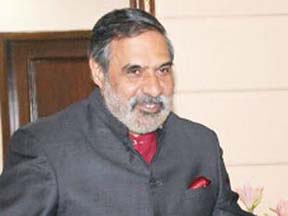 BALI: On the eve of WTO ministerial meeting here, India today said the interim solution on food security as currently designed is not acceptable and the country won’t compromise its farmers’ interest or succumb to mercantilist ambitions of rich nations.
BALI: On the eve of WTO ministerial meeting here, India today said the interim solution on food security as currently designed is not acceptable and the country won’t compromise its farmers’ interest or succumb to mercantilist ambitions of rich nations.
There is a national consensus and complete political unanimity on this matter in India, Commerce and Industry Minister Anand Sharma said, adding: “It is therefore difficult for us to accept an interim solution as it has been currently designed.
“We can no longer allow the interests of our farmers to be compromised at the altar of mercantilist ambitions of the rich. The Bali Ministerial Meeting is an opportunity for the developing countries to stay united in resolve to demonstrate the centrality of agriculture in trade talks.”
Developed countries have proposed an interim solution of four-year ‘peace clause’ during which period India would not attract penalty even if the 10 per cent cap is broken.
As per the existing Agreement on Agriculture (AoA) of the Geneva-headquartered WTO, farm subsidy has to be capped at 10 per cent of the total value of the farm production. India has raised issues regarding the way the cap value is benchmarked to the base price.
In a statement at a meeting of the G-33 in Bali on the eve of the 9th Ministerial Conference of the World Trade Organization, Sharma said that for decades, “handful of farm lobbies of some countries” have shaped the discourse and determined the destiny of millions of subsistence farmers of the developing countries.
“The massive subsidization of the farm sector in the developed countries is not even a subject matter of discussion, leave aside serious negotiations,” he said.
He further said that food security must be protected from all challenges in the WTO as it is not only a sensitive issue for India but also a critical social imperative. . India’s Food Security Act entitles 82 crore people to 5 kg of foodgrain per person a month at Rs 1-3 per kg. The country needs 62 million tonne foodgrain a year to implement the law.
Sharma said that as a responsible nation, India is committed to a constructive engagement for finding a lasting solution. “But till such time that we reach there, an interim solution which protects us from all forms of challenge must remain intact,” he added.
Procurement and public stock-holding for food security are invaluable instrumentalities used by developing countries to secure interests of the poor and the vulnerable.
Sharma asked the leaders for updating of WTO rules under the AoA as it would rectify inherent flaws and then help developing countries in carrying out such legitimate operations without defaulting on their commitments.
The G-33 proposal on food security, Sharma said, aims to address the problems faced by developing countries due to outdated WTO rules which base agriculture subsidy calculation on external reference prices of 1986-88, even as global food prices have increased manifold during this period.
It is surely reasonable, the Minister said, that “we should not be asked to peg farm support calculations on prices which were prevailing thirty years ago”.
Stating that reforms in agriculture trade rules envisaged in the Doha Development Agenda (DDA) would have made a major contribution towards improving the lot of poor farmers, Sharma noted that “unfortunately, a consensus on the overall agriculture had eluded members so far”.
The G-33 meeting, chaired by the Minister of Trade of Indonesia Gita Wirjawan, was attended by all its 47 member countries.
India is pinning hopes on wide support from the grouping of G-33 which includes China and Indonesia. However, given the political compulsions back home in an election year, sources said, India would prefer a “no deal to bad deal”, especially with regard to farmers. -PTI





